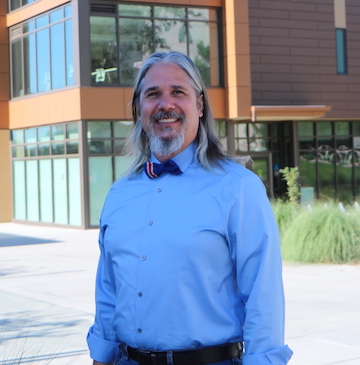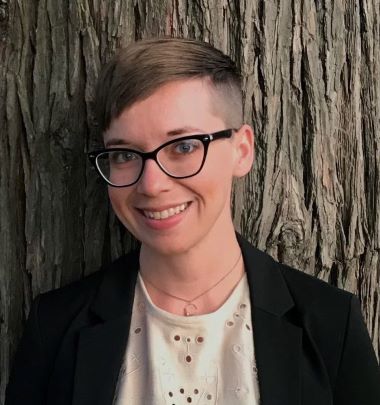About Us
Founded in 1989, The University Honors Program is home to approximately 650 of CSUSB’s students. Alongside their peers, Honors students participate and serve as officers in clubs, sororities, and fraternities, they conduct research in labs across campus, they create all manner of art in studios, and they embark into the community to give back to the region that raised them. Our faculty and staff work collaboratively to govern the program with a student leadership team that shares responsibility for decision making in the life of the program.
In 2018, The University Honors Program opened its facility, located in Cajon Hall, part of CSUSB’s newest residence facility, Coyote Village. There you can find classrooms, administrative offices, a computer lab, and student study and lounge spaces.
Mission and Goals
Mission
The California State University San Bernardino University Honors Program develops public scholars and artists who embrace inquiry and exploration as ways to understand the complexities of the world. As a community of curiosity, the Honors Program strives to empower CSUSB students to identify and pursue opportunities for educational, social, and professional development that will contribute to successful and impactful futures.
Goals
1. The University Honors Program cultivates individuals who identify their own beliefs and values within an ethical framework.
2. The University Honors Program fosters life-long learners who pursue knowledge through inquiry, exploration, and application;
3. The University Honors program nurtures citizens who engage with a community and work towards its success.
The program’s staff works in collaboration with students and campus personnel to develop these goals through three distinct program components: the curriculum, co-curricular programs , and a residential program.
Outcomes
Collaboration: Work collaboratively with persons from different fields of specialization in diverse, cross-disciplinary teams to analyze and/or solve applied issues and problems.
Scholarship (breadth): Demonstrate an understanding of the diverse nature of scholarship in the university by applying the tools (methodologies/content/skills) of multiple disciplines to analyze and/or solve complex issues and problems.
Inquiry (depth): Design, plan, and execute an original research or creative project in a particular discipline or interdisciplinary field that would meet professional standards in that discipline or field.
Civic Engagement: Demonstrate social consciousness, community building, and engaged civic responsibility through participation in campus and community activities and service.
Personal Development: Synthesize academic, professional, and community involvement into an action plan for post-baccalaureate aspirations, revealing personal strengths, weaknesses, and significantly changed perspectives about life experience.
Meet the Staff

David Marshall, PhD, Faculty Director
Since joining the English faculty at CSUSB in 2007, David Marshall has filled a variety of roles at the University. In addition to being the English Department’s medievalist, he has served as the program coordinator at the Palm Desert Campus, a club advisor, the Interim Assistant Dean for the College of Arts and Letters, and as that college’s Assessment Coordinator. Dr. Marshall has also participated in a variety of committees and task forces on the campus, including work on freshman seminars, campus assessment, and revision of the General Education program. In 2015 he was named the Faculty Director of the University Honors Program, a role he as described as his “dream job.” As Director, Dr. Marshall oversees the program’s operations, advises Honors students, promotes the program both on and off campus, and leads efforts to redesign the program’s curriculum and co-curriculum.
In his research, Dr. Marshall works on two distinct areas. His most recent research studies teaching and learning in higher education. As a senior scholar with The National Institute for Learning Outcomes Assessment, he has led national higher education reform initiatives and co-authored papers, articles, and professional resources on the alignment of higher education. He is frequently invited to speak on the subject both nationally and internationally and is coauthor of Degrees That Matter: Moving Higher Education to Learning Systems Paradigm, which reframes the ways in which higher education is organized. In his work on medieval studies, he explores the ways in which medieval literature and culture are redeployed in popular culture, including movies, games, novels, music and comic books. He has published extensively on adaptations of the Anglo-Saxon poem Beowulf and is the editor of Mass Market Medieval (McFarland, 2007), a collection of essays that examines the diverse ways in which medievalism permeates popular culture.

Brystal Nevins-Grimm, Administrative Support Coordinator
Brystal was first introduced to the CSUSB University Honors Program when she transferred as an undergraduate student in Fall 2021. As a student employee, her work primarily focused on easing the transition for honors transfer students from our local community colleges. Since graduating from CSUSB with her BA in Communication Studies: Relational and Organizational Communication, in May 2023, Brystal has been thrilled to join the Honors Program team as a full staff member. She hopes that sharing her experience as a CSUSB alumna, an Honors Program alumna, and as a Honors Program transfer student will help honors students take advantage of the opportunities one can find in our Honors Program. She hopes that they can use these opportunities to go further in their education and professional goals, to places they might not have previously expected they could reach, just as she had.
Faculty
First Year Experience Faculty
The Honors Program’s core curriculum for lower division students is taught by exceptional faculty with special expertise in the fields in which they teach. With graduate degrees in Rhetoric & Composition, Philosophy, and Communication Studies, the First Year Experience faculty devise experiences for students that provide a foundation for future learning in the Honors Program.
Brianna Deadman
-San Bernardino Campus, Palm Desert Campus
I take an interdisciplinary approach to teaching the first-year seminar courses, HON 1000, 1100, 1200, and 1300. My approach strives to make connections across all of your classes and your lives outside of the classroom. We build on the skills you learn in each class, pulling on similar threads in different ways, to deepen your knowledge, expand your perspective, and create a cohesive first-year experience.
My scholarship focuses largely on adaptation theory, rhetoric, and gender studies. Beyond my scholarship (and undoubtably entwined with it), I am an avid reader, tea drinker, Renaissance Faire go-er, camper, rock climber, animal lover, trivia fan, and history buff.
What to expect joining their class: Expect to work together as an active community of learners to explore language in use in various contexts. Our classes focus on the study and uses of written, spoken, and visual language and the ways in which we communicate effectively to construct meaning and identity, to create knowledge, mediate power, produce change, and organize and maintain social groups
Dustin Shepherd
-San Bernardino Campus
I typically teach Writing Rhetorically (HON 1100) and Constructing Knowledge (HON 1000). I have been researching film reboots and sequels in order to analyze senses of ownership and critical engagement with these properties. In addition to my academic interests/pursuits, I am also an avid bowler.
What to expect joining their class: Students should expect to engage with the material. I try to make my classroom a relaxing environment in order to help students develop and express their own ideas in a comfortable setting. Expect to challenge, expand, and question ideas about composition.
Megan Zane, PhD
-San Bernardino Campus
I typically teach for the Philosophy Department: introduction courses in general Philosophy and Ethics, and upper division courses on Philosophy of Gender and Philosophy of Language. I’m also a painter of mostly colorful abstract pieces in acrylics. I read a lot of scifi/fantasy and really enjoy resource management video games.
What to expect joining their class: Learning about critical thinking can feel very abstract and weird. So in my course, I focus on how critical thinking is a skill that we already use in ordinary everyday life. We improve this skill by examining specific tools of critical thinking and their practical applications to a wide variety of topics. Some topics we cover include: validity and deduction, technology design, science, politics and ethics, and disability rights. We have a modest amount of dense reading each week and lots of low stakes opportunities to practice thinking, writing, and communicating about the world.
Tabitha Zarate
-San Bernardino Campus
I work in the Honors Department, teaching Honors 1100 Writing Rhetorically and 1000 Constructing Knowledge. I research pop culture, comics and graphic novels, visual rhetoric, feminist and gender studies, and dabble in a few other interests. A fun fact about me is that I play a lot of D&D and video games when I am not grading papers or petting cats.
What to expect joining their class: Students should expect a warm welcome in my classes, and to help build a community dedicated to bettering themselves as writers and rhetoricians, and constructors of knowledge!
Faculty Fellows
The Honors Program’s Faculty Fellows are those faculty who join the University Honors Program as part of their teaching in the Junior Year Interdisciplinary Inquiry Experience. Based on their submission of proposals to teach in the program, they are selected by the Faculty Senate Honors Committee in consultation with students in the University Honors Program.